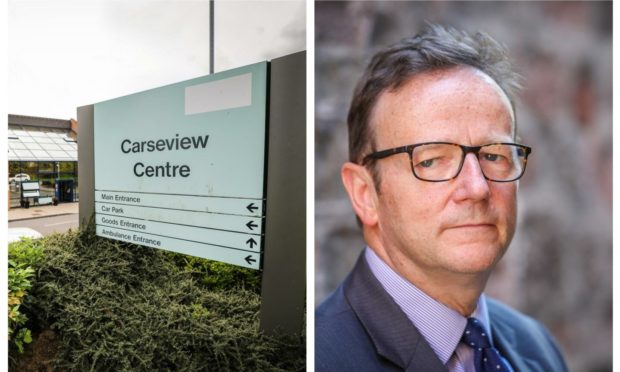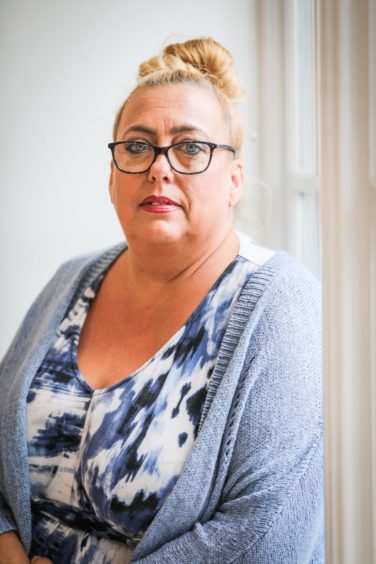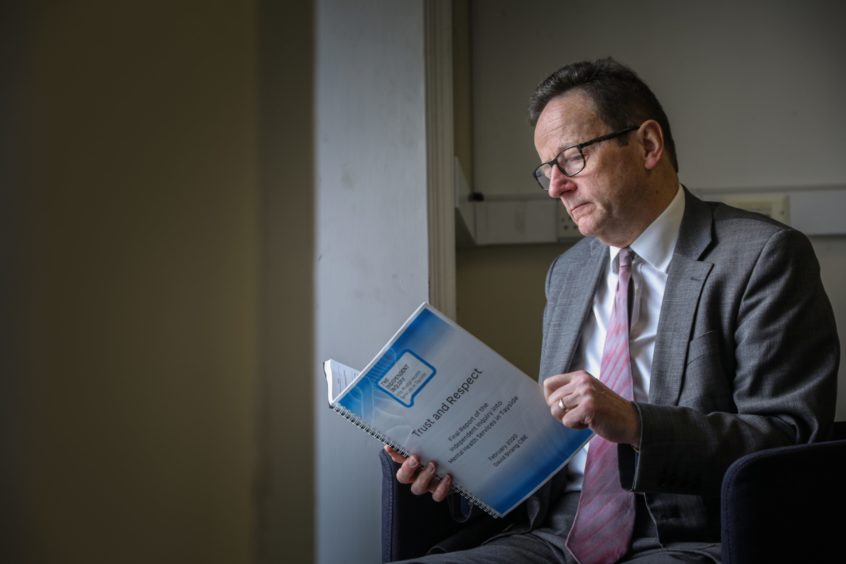NHS Tayside’s claim to have tackled a long-term culture of bullying in mental health services has been branded unrealistic by an independent review.
The health board was heavily criticised for its organisational culture in a February 2020 report with the authors stating this had led to patients being repeatedly let down.
Some have killed themselves after receiving treatment at Dundee’s troubled Carseview Centre while others report being told to “get a grip” when asking for help.
Not credible or realistic
Despite the cultural reboot being identified as a long-term but key recommendation in the Independent Inquiry into Mental Health Services, NHS Tayside said it had been delivered in just 13 months.
An 18-month review led by the head of the inquiry, Dr David Strang, has now branded this extremely unlikely.
The report, published on Tuesday, said: “It is not credible or realistic that culture change of such magnitude could be implemented in such a short time.
“At the time of publication of the report [in February 2020], it was anticipated that these two recommendations would require a much longer timeframe to implement (perhaps over several years).”
It added: “This response suggests Tayside has not fully appreciated and understood the cultural change requirements that were identified.”
Many staff feel undervalued and undermined almost daily, it states, and that a culture of trust is still lacking.
Families blame health board for deaths
Dundee grandmother Mandy McLaren says she blames NHS Tayside for the 2015 death of her son.
Dale Thomson took his own life shortly after receiving treatment at the city’s troubled Carseview Centre.
A fatal accident inquiry (FAI) later ruled his death was “unavoidable” but found there were shortcomings in NHS systems which were “relevant” to Dale’s death.
Ms McLaren says she believes bullying is too deep-rooted within management at NHS Tayside and fears patient outcomes will not improve any time soon.
She said: “They have been behaving like this for so long and getting away with it.
“Nobody said it would be a quick fix but if the ones higher up let it happen and do it themselves then it will never change.
“It will be the good staff and the patients who will ultimately suffer.”
What else did the review say?
Poor communication was another key issue identified with patients being referred to psychiatrists despite there being none available for weeks.
The problem centred on the Community Mental Health Teams (CMHT), who the report says are continuing to struggle with the demands placed on them.
It said: “It seems there is a lack of communication about the difficulties the service is experiencing.
“Cluster 4 CMHT had no psychiatrist for several weeks, but those working in primary care making referrals did not know.
“Primary care teams supporting their patients with mental ill-health report that it is difficult to feel optimistic about services improving when there is little or no communication.”
On Carseview and other in-patient services, it recognised there have been improvements but that progress is being impeded by difficulties recruiting extra staff.
Another issue identified is the fact a director of mental health was appointed for a year but left in March 2021 and has not been replaced.
Without such a leader, the implementation of the new mental health strategy is at risk, the inquiry states, and raised concern “the momentum of the last year may be lost”.
It also added there is a danger that the health board is being “over-optimistic” in how quickly many of the recommendations can be met.
It levelled some criticism at the leadership too, stating it is “clearly still divided” and despite lots of improvements, is also still lacking within Child and Adolescent Mental Health Services (CAMHS).
It said: “There continues to be a gap between what is stated publicly at a board level and the reality of the experience of those delivering the service and of patients, carers and families.”
What did the original report say?
Dr David Strang’s Trust and Respect report identified 51 recommendations to be implemented.
Summarising his findings at the time, Dr Strang said: “A breakdown in trust and a loss of respect has…led to poor service, treatment, patient care and outcomes.”
The health board’s chief executive Grant Archibald made a public apology after the failings were detailed and has promised to personally oversee the required improvements.
The initial review highlighted failings including a breakdown of trust, not delivering services, lack of psychiatrists, lack of leadership and a lack of accountability.
It took evidence from 1500 people.
NHS Tayside say 35 are complete, 14 have work ongoing and two are being delivered by Scottish Government.
Dr Strang has said the above should be assessed independently however.
What has David Strang said?
Dr Strang, who is chair of the inquiry, said: “It is clear that a great deal of positive work has been undertaken in Tayside over the last year, following the publication of the Trust and Respect report.
“It is commendable that a new strategy for mental health – Living Life Well – has been developed, given the extraordinary demands of responding to the coronavirus pandemic.
“However, there remains a long way to go to deliver the longer-term improvements that are required. There have been some missed opportunities for listening to people and engaging with partners in order to build trust.
“I am grateful to everyone who supplied information or gave evidence to the Independent Inquiry Review team.”
Inquiry Timeline
January 2015 — Dale Thomson takes his own life days after treatment at Carseview.
October 2016 — David Ramsay kills himself after being turned away from Carseview. Niece Gilly Murray and Mr Thomson’s mother Mandy McLaren are among those who campaign for an independent inquiry into mental health services in Tayside.
July 2018 — A BBC documentary includes damning testimony of excessive use of restraints on patients at Carseview.
September 2018 — The inquiry, headed by Dr David Strang, launches a public call for evidence. More than 200 submissions were made.
May 2019 — 22-page interim report finds a “litany” of shortcomings, including people with drug and alcohol problems being turned away and GP referrals being rejected.
June 2019 — Dr Strang casts scorn at an NHS Tayside health board meeting for a lack of action since the interim report was published.
October 2019 — Ms Murray and other campaigners call for pledge the recommendations will be acted upon. First Minister Nicola Sturgeon said she expects the board to “take account of recommendations”.
February 2020 — 134-page full report published, which finds a scattered mental health service throughout Tayside that require changes that “cannot occur overnight”.
July 2021 — David Strang’s 18-month review of progress published.
What has NHS Tayside said in response?
NHS Tayside chair Lorna Birse-Stewart said: “The review team state in today’s report that it found a great deal of positive changes in progress and was impressed with the commitment and dedication of staff, partner organisations and others seeking to make a difference for patients and the wider community in Tayside.
“The report also recognises good progress on improvements to services across Tayside.
“This includes praise for the work to develop better ways to support inpatients and their families and carers on wards by involving them in care planning, ongoing improvements in Child and Adolescent Mental Health Services and the delivery of many positive developments in the community such as the mental health discharge hub and the local mental health hubs planned in each Health and Social Care Partnership area.
“This feedback to our frontline health and social care teams delivering mental health services is extremely welcome as they have delivered these improvements against a backdrop of the uncertainties and additional daily challenges in dealing with the response to the Covid-19 pandemic.”
Challenges remain
Ms Birse-Stewart said the health board recognises significant change is still needed.
She said: “Nonetheless, we very much recognise that challenges remain in a number of key areas for all partners involved in delivering mental health and learning disability services in Tayside.
“These include clinical staffing, the longer-term achievement of a shift in culture for patients, families and staff, a simplification of the more complex arrangements and relationships between organisations providing different aspects of services and the ongoing commitment to co-design services which are truly centred around communities and individuals in need.
“The board of NHS Tayside will continue to make mental health and wellbeing a priority for action and has re-stated its commitment to do everything it can to make a difference and improve the mental health and wellbeing of the citizens of Tayside.”


